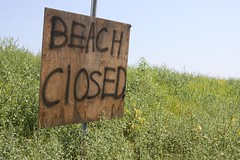 Despite statements from the Coast Guard and BP supporting media access to sites related to the Gulf of Mexico oil spill, journalists continue to be threatened, intimidated, and denied access as they attempt to cover what many consider to be the worst environmental disaster in the history of the United States. Considering the unprecedented and unknown impacts of the spill, the public is relying heavily on unimpeded journalists to uncover the causes, responses, and consequences of the disaster.
Despite statements from the Coast Guard and BP supporting media access to sites related to the Gulf of Mexico oil spill, journalists continue to be threatened, intimidated, and denied access as they attempt to cover what many consider to be the worst environmental disaster in the history of the United States. Considering the unprecedented and unknown impacts of the spill, the public is relying heavily on unimpeded journalists to uncover the causes, responses, and consequences of the disaster.